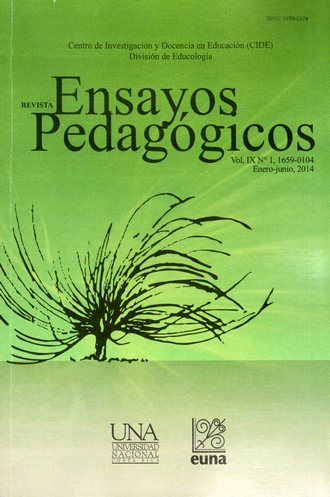Theory of Education and Philosophy
DOI:
https://doi.org/10.15359/rep.9-1.3Keywords:
education, philosophy, theory, models, pedagogy, epistemologyAbstract
The Theory of Education cannot be disengaged from Philosophy, so it is necessary for the teacher contemporary to have philosophical principles and concepts, be them anthropological or epistemological. The role of philosophy education gives to the teacher cognitive a input that enriches his or her teaching practice. This essay consideres such symbiosis as education-philosophy, elaborating on ideas that lead to reflection on the development of education as a theoretical process, and from this to pedagogical practice, which generates new didactic theories framed in the necessity that education in general indentifies in philosophy its epistemological and vital basis particularly in university teaching.
References
Brenes, E. y M. Porras. (2012). Teoría de la educación. San José, Costa Rica: EUNED.
Bunge, M. (1998). La ciencia: su método y su filosofía. Buenos Aires, Argentina: Editorial Sudamericana.
Bunge, M. (1984). Ciencia y desarrollo. Buenos Aires, Argentina: Ediciones Siglo Veinte.
Calderón, K. (2007). La didáctica hoy, concepciones y aplicaciones. San José, Costa Rica: EUNED.
Flórez, R. (2005). Pedagogía del conocimiento. Bogotá, Colombia: McGraw-Hill.
Freire, P. (2010). El GritoManso.México: Siglo XXI.
Hessen, J. (2007). Teoría del conocimiento. México:Editores Mexicanos Unidos S.A.
Medina, A y Salvador, F (2009). DidácticaGeneral.Madrid: Pearson. Recuperado de http://190.202.118.250/diseno2/cnifpm_web/media/k2/attachments/didactica/coleccion-didactica-didactica-general.pdf
Michel, J.A. (2006). Sobre el estatuto epistemológico de las ciencias.Revista de Teoría y Didáctica de las Ciencias Sociales, 11, 139-157.
Morales, C., Cordero, G., López, J., Serrano, A. Rojas, C. y Mora, A. (2004). Heredia, Costa Rica: Cuadernos Prometeo N° 32.
Pinto, R. (2012). Principios filosóficos y epistemológicos del ser docente. San José, Costa Rica: CECC/SICA.
Rojas, C. (2006). La ciencia como lenguaje. Heredia, Costa Rica: Colección Prometeo N° 35.
Salazar, M. (2006). Sobre el estatuto epistemológico de las ciencias de la educación. Revista de Teoría y Didáctica de las Ciencias Sociales, 11 (11). Recuperado de http://www2.scielo.org.ve/scielo.php?script=sci_arttext&pid=S1316-95052006000100007&lng=es&nrm=Iso&tlng=es
Soto, J. y Bernardini,A.. (2009). La educación actual en sus fuentes filosóficas. San José, Costa Rica: EUNED.
Vásquez, E. (1985). Principios y técnicas de educación de adultos. San José, Costa Rica: EUNED.
Zubiri, X. (2010).Cincolecciones de filosofía.Madrid, España: Alianza Editorial.
Downloads
Published
How to Cite
Issue
Section
License
Ensayos Pedagógicos is subscribed to the Attribution-NonCommertial-NoDerivatives 4.0 International Creative Commons Licence, which allows both authors and readers to freely download, store, copy, and distribute the final approved publisehd version of the manuscript (post-print) as long as this is done without commercial purposes, no derivative works are generated, and the source and author are mentioned. As well, Ensayos Pedagógicos declares that authors will remain the rightful owners of the copyrights of their work in perpetuity.







